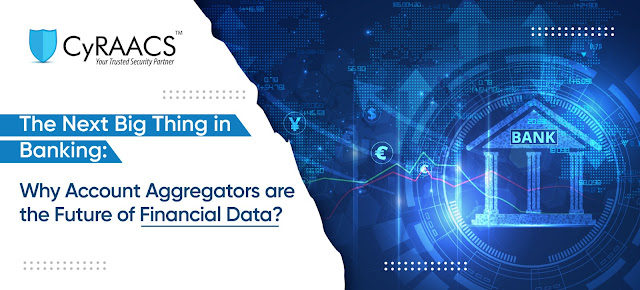The Next Big Thing in Banking: Why Account Aggregators are the Future of Financial Data?
The world of banking and finance is constantly evolving, and new technologies are revolutionizing the way we manage our money. One such technology that has the potential to transform the financial landscape is account aggregation. In this blog post, we'll explore the concept of account aggregation, and discuss why it has the potential to be the next big thing in banking.
What is Account Aggregation?
Account aggregation is a technology that allows users to view and manage all of their financial accounts in one place. This includes bank accounts, credit cards, investment accounts, and other financial products. Account aggregation platforms collect data from different financial institutions, aggregate it, and present it in a single interface. This makes it easy for users to monitor their financial health, track spending, and make informed financial decisions.
Account aggregation is not a new concept, and there are several platforms available in the market today. However, the concept has gained renewed interest in recent years, thanks to the rise of open banking and the introduction of account aggregator frameworks in some countries.
Account Aggregation in India
In India, the concept of account aggregation has gained momentum with the introduction of the account aggregator framework. The Reserve Bank of India (RBI) introduced the framework in 2016, and it has since been adopted by several banks and fintech companies.
Under the account aggregator framework, users can link their financial accounts to a licensed account aggregator, which collects and stores the data securely. The user can then grant access to this data to third-party financial services providers, such as loan providers, financial advisors, and investment platforms. This enables users to access a range of financial products and services from different providers, all through a single platform.
Why Account Aggregators are the Future of Financial Data
So, why do we think that account aggregators are the future of financial data? Here are some of the key reasons:
1. Improved Financial Visibility and Control
One of the prima
ry benefit of account aggregation is that it provides users with a comprehensive view of their financial health. With all of their financial accounts in one place, users can easily track their spending, monitor their savings, and identify areas where they can cut back on expenses. This can help users to improve their financial health and make informed financial decisions.
2. Increased Efficiency and Convenience
Account aggregation also offers significant efficiency and convenience benefits. Rather than logging into multiple accounts and platforms, users can view all of their financial information in one place. This can save time and reduce the likelihood of errors, such as double payments or missed bills.
3. Access to a Range of Financial Products and Services
By granting access to their financial data to third-party providers, users can access a range of financial products and services from different providers. This can include loan products, investment platforms, insurance products, and more. Users can compare different options and choose the products and services that best meet their needs.
4. Enhanced Data Security and Privacy
Data security and privacy are critical concerns in the financial sector. Account aggregation frameworks are designed to ensure that user data is collected, stored, and shared securely. Users have control over who can access their data, and their data is protected by advanced encryption and security protocols.
5. Empowering Financial Inclusion
Account aggregation has the potential to empower financial inclusion, particularly for underserved segments of the population. By providing access to a range of financial products and services, users can improve their financial literacy and make informed financial decisions. This can help to bridge the gap between the unbanked and the banking sector and promote financial inclusion.
Also Read: What is an Account Aggregator?
Furthermore, account aggregation has the potential to drive innovation in the financial sector. By providing access to user data, third-party providers can develop new products and services that meet the evolving needs of consumers. This can lead to increased competition, which can ultimately benefit users through lower costs, better products, and improved services.
However, there are also some challenges associated with account aggregation. One of the key concerns is the potential for data breaches and cyber-attacks. As more financial data is collected and shared, the risk of data breaches and cyber-attacks increases. This underscores the importance of robust data security and privacy protocols.
Another challenge is ensuring that users have control over their data. Users must be able to grant and revoke access to their data easily and should have the ability to choose which providers can access their data. This requires clear and transparent communication from account aggregators and third-party providers.
Finally, there is a need for regulatory oversight to ensure that account aggregation frameworks are developed and implemented in a safe and secure manner. This includes ensuring that user data is collected, stored, and shared securely and that user privacy is protected.
Conclusion
Account aggregation is an exciting concept that has the potential to transform the financial landscape. By providing users with a comprehensive view of their financial health, account aggregation can help to improve financial literacy and empower financial inclusion. It also offers significant efficiency and convenience benefits and enables users to access a wider range of financial products and services. With enhanced data security and privacy, account aggregation frameworks ensure that user data is collected, stored, and shared securely, which is critical in today's data-driven world.




Comments
Post a Comment